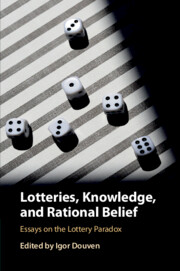Book contents
- Lotteries, Knowledge, and Rational Belief
- Lotteries, Knowledge, and Rational Belief
- Copyright page
- Contents
- Contributors
- Introduction
- Chapter 1 Rational Belief and Statistical Evidence
- Chapter 2 Knowledge Attributions and Lottery Cases
- Chapter 3 The Psychological Dimension of the Lottery Paradox
- Chapter 4 Three Puzzles about Lotteries
- Chapter 5 Four Arguments for Denying that Lottery Beliefs Are Justified
- Chapter 6 Rethinking the Lottery Paradox
- Chapter 7 Rational Belief in Lottery- and Preface-Situations
- Chapter 8 Stability and the Lottery Paradox
- Chapter 9 The Lottery, the Preface, and Epistemic Rule Consequentialism
- Chapter 10 Beliefs, Probabilities, and Their Coherent Correspondence
- Chapter 11 The Relation between Degrees of Belief and Binary Beliefs
- Bibliography
- Index
Chapter 2 - Knowledge Attributions and Lottery Cases
A Review and New Evidence
Published online by Cambridge University Press: 29 January 2021
- Lotteries, Knowledge, and Rational Belief
- Lotteries, Knowledge, and Rational Belief
- Copyright page
- Contents
- Contributors
- Introduction
- Chapter 1 Rational Belief and Statistical Evidence
- Chapter 2 Knowledge Attributions and Lottery Cases
- Chapter 3 The Psychological Dimension of the Lottery Paradox
- Chapter 4 Three Puzzles about Lotteries
- Chapter 5 Four Arguments for Denying that Lottery Beliefs Are Justified
- Chapter 6 Rethinking the Lottery Paradox
- Chapter 7 Rational Belief in Lottery- and Preface-Situations
- Chapter 8 Stability and the Lottery Paradox
- Chapter 9 The Lottery, the Preface, and Epistemic Rule Consequentialism
- Chapter 10 Beliefs, Probabilities, and Their Coherent Correspondence
- Chapter 11 The Relation between Degrees of Belief and Binary Beliefs
- Bibliography
- Index
Summary
In this chapter, I review recent empirical findings on knowledge attributions in lottery cases and report a new experiment that advances our understanding of the topic. The main novel finding is that people deny knowledge in lottery cases because of an underlying qualitative difference in how they process probabilistic information. “Outside” information is generic and pertains to a base rate within a population. “Inside” information is specific and pertains to a particular item’s propensity. When an agent receives information that 99 percent of all lottery tickets lose (outside information), people judge that she does not know that her ticket will lose. By contrast, when an agent receives information that her specific ticket is 99 percent likely to lose (inside information), people judge that she knows that her ticket will lose. Despite this difference in knowledge judgments, people rate the likelihood of her ticket losing exactly the same in both cases (i.e., 99 percent). The results shed light on other factors affecting knowledge judgments in lottery cases, including formulaic expression and participants’ own estimation of whether it is true that the ticket will lose. The results also undermine previous hypotheses offered for knowledge denial in lottery cases, including the hypotheses that people deny knowledge because they either deny justification or acknowledge a chance for error.
- Type
- Chapter
- Information
- Lotteries, Knowledge, and Rational BeliefEssays on the Lottery Paradox, pp. 28 - 47Publisher: Cambridge University PressPrint publication year: 2021
- 3
- Cited by



